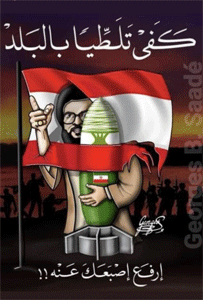Hezbollah is buying time with farcical Lebanese-Israeli maritime border talks
Makram Rabah/Al Arabiya/October 09/2020
مكرم رباح: حزب الله يحاول شراء الوقت من خلال محادثات هزلية تتناول
ترسيم الحدود البحرية اللبنانية-الإسرائيلية
Lebanon’s recent announcement that it would start talks with Israel to demarcate its maritime border was welcomed by many. But on closer inspection, the move is a farce that has little chance of solving Lebanon’s problems.
In theory, the demarcation of the contested areas between Lebanon and Israel will allow both sides to benefit from the oil and gas fields on their border and encourage international oil companies to invest in the area. This is especially important to Lebanon given that any injection of funds would help its crumbling economy and stop the rapid devaluation of the currency and the accompanying inflation.
On face value, Hezbollah’s agreement to the talks may appear to be a softening of its position on Israel. The Trump administration, which mediated the process, can also present the talks as another diplomatic achievement following the normalization deals between Israel and the UAE and Bahrain.
However, a closer inspection reveals the talks are a farcical attempt by Hezbollah to ease mounting pressure against it. Hezbollah and its Iranian overlords are trying to buy time amid biting US financial sanctions, repeated Israeli attacks against its fighters, and the recent mysterious explosion in their military facilities.
It is no fluke that Iran, through Hezbollah, has sanctioned the demarcation to commence a mere month from the US presidential elections. Iran hopes Democratic nominee Joe Biden will win, facilitating the reinstatement of the 2015 nuclear deal.
The Trump administration secured the talks by going through Nabih Berri, the Shia speaker of parliament who heads the Hezbollah-allied Amal party. This was a baffling mistake, as it gave Hezbollah a public relations victory, suggesting that it needed to be consulted with to achieve progress. Instead, the proper move would have been for the US to engage directly with the executive branch, which has the constitutional right to negotiate demarcation issues.
The talks themselves may also aid Hezbollah and its Iranian backers. Hezbollah’s position in the country is currently so entrenched that any new sources of funds from gas revenues could be hijacked by the organization, cementing its hold over the Lebanese state.
What will take place on October 14 – the date outlined for the talks at the United Nations Interim Force in Lebanon (UNIFIL) headquarters on the border – will not just be talks about merely demarcating the border. Instead, the talks are a clear message that Iran wants to pursue its version of normalization with Israel. But unlike the United Arab Emirates and Bahrain, which have normalized diplomatic relations with Israel, Iran’s approach is not based on normal relations.
As with the 2015 nuclear deal, Iran likes to present itself as open to diplomacy while in fact using the grace period from talks to gain more ground through expanding its militia network. Even if it engages the US and Israel in any forms of talks, Iran will refuse to disarm its Hezbollah or work toward empowering Lebanon. Instead, Iran’s approach means tightening its grip over all aspect of the Lebanese state, or what remains of it. Rather than normalization, Iran is willing to engage in just demarcation while advancing its aims elsewhere.
Even then, Hezbollah has only showed openness to demarcating borders that do not undermine its interests. There has been no progress made on the disputed Shebaa Farms, a 28 square kilometer region right on the nexus of the Syrian-Lebanese-Israeli border, which technically belongs to Syria and is currently occupied by Israel. The Shebaa Farms has long provided Hezbollah with the pretext to keep its arms and therefore putting it at the center of the demarcation talks would have given the Lebanese people, or at least those fighting for them, the chance to demand the decommissioning of Hezbollah’s arms.
Nevertheless, even if these maritime demarcation talks do not remove the Shebaa pretext, they have proven that diplomatic channels are the best recourse for Lebanon to achieve its long-term interests. Yet , the Lebanese state is nowhere to be found, and its diplomatic channels have been completely hijacked by Hezbollah and its allies who have alienated and ostracized the international community. This includes Emmanuel Macron’s France, which has expressed eagerness to help.
The August 4 Beirut Port blast did not only destroy the eastern part of the capital but it also killed and injured many of the families of the diplomatic corps in Lebanon. This corps always went out of its way to help Lebanon, was underserving of a phone call or even a consolation letter to check up on their children and spouses, will hold this intended lapse to heart.
The Israeli-Iranian demarcation, or possible normalization, using Lebanon has proven yet again that Hezbollah has no red lines, and that if the Lebanese truly want their country to become worthy again, they should reconnect with the international community and ask their assistance to redraw a new map that leads them to reclaim their lost state. Ultimately demarcation, or the illusion of it, should not sideline the ever-important demands for Lebanon’s neutrality and disassociation – the only exit from Lebanon’s current inferno.






















